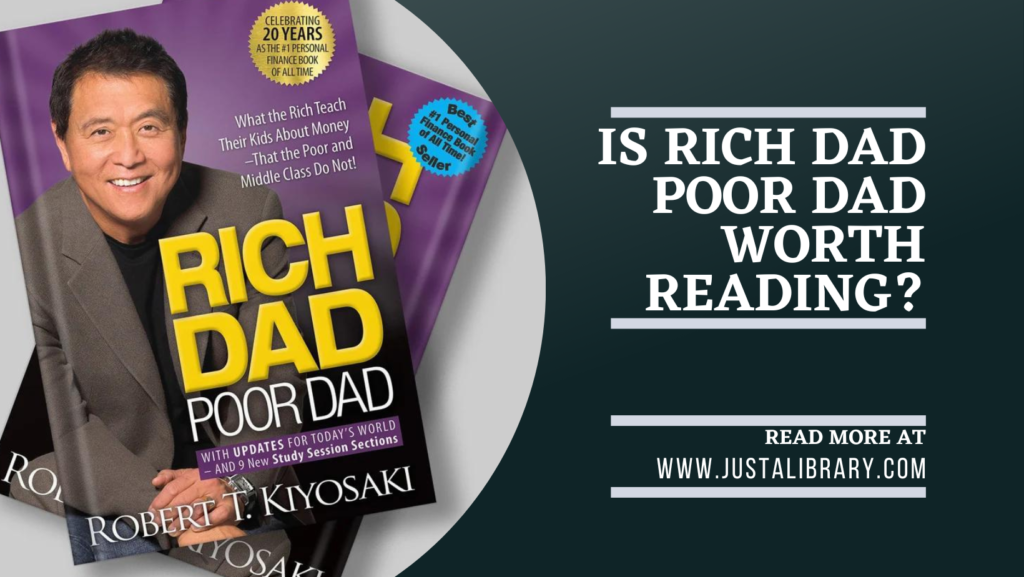Rich Dad Poor Dad Summary & Review – Rich Dad Poor Dad is a modern classic of personal finance and an International best-selling book of all time written by Robert Kiyosaki based on his real-life experiences. Robert Kiyosaki is an American entrepreneur, author, and a big supporter of financial education. He has authored several books based on his life experiences. His books have sold over 41 million copies worldwide. Read the full article to know more about his book, summary, key takeaways, etc.
LIKE WHAT YOU READ? WHY NOT SUBSCRIBE?
Rich Dad Poor Dad Summary & Review
In this book, Robert Kiyosaki recollects his childhood memories of his two fathers. His father and his best friend’s father. While he has fond memories of both, they were different perspectives on finances.
- This book is about Robert Kiyosaki’s (Poor Dad) and his friend’s (Rich Dad) and how both men shaped his thoughts about money and investing.
- The concept of a rich dad vs. a poor dad should help people stop blaming others for their financial problems. Instead, it should teach people that they are responsible for their financial well-being- no one else is responsible for that but them.
- Robert Kiyosaki’s ideology of “ you don’t need to earn a high income to be rich”.
- We let the two most common emotions linked with money, fear, and greed, rule our decisions. That is why we still abide by the old mentality “Go to school, go to college, get a job, play it safe,” even though no job is safe any longer. The author shares his life examples to help others escape the rate race.
Rich Dad Poor Dad Takeaways
1. The poor and the middle-class work for money. The rich have money to work for them
The idea is to invest, buy assets, sell, and build businesses that make profits and make money and make that money work for you instead of relying solely on paychecks. He brings out facts and real examples of Rich people working smartly to reach financial freedom.

People who are controlled by fear and greed drive the Rat Race. Their fear of not having enough money motivates them to get out of bed, go to work, and pay their bills. When they are paid more, their desire drives them to increase their spending, which forces them to continue working indefinitely. Most people in this cycle believe that money will alleviate their anxiety, but it never does.
2. Why learn financial literacy?
A concept you might be familiar with. Today the internet is filled with this message. Robert Kiyosaki has explained this in his book on the topic “why financial literacy”. Financial literacy is required to make, grow, and save money over time. You can make a lot of money and still be broke if you are not financially literate. You can use it to learn smart ways to make money work for you over time.
3. It’s not how much money you make that matters. It’s how much money you keep.
You could make a million dollars today, but if you mismanage it tomorrow, it doesn’t really matter if you made a million. The true strength lies in limiting or, as most of us refer to it, budgeting. Some guy making money and keeping it for a few generations; means he made the money and multiplied it across generations. He or she made it work for them. Make money work for you rather than being slaves to it. If you are worrying about your future and thinking about how you can manage these recession times, then you should read our article on a helpful guide on how to prepare for a recession.

One definition of wealth is that of R. Buckminster Fuller: “Wealth is a person’s ability to survive so many days forward – or, if I stopped working today, how long could I survive? The first step toward becoming wealthy is to ensure that your assets’ income exceeds your expenses.
4. Rich people acquire assets. The poor and middle class acquire liabilities that they think are assets
To be rich, you must understand the distinction between an asset and a liability and invest in assets. It may appear to be a simple rule, but most people have no idea how difficult it is. People struggle financially because they do not understand the distinction between an asset and a liability.
An asset is a source of income for you. A liability consumes your money. Despite this, people pour their money into liabilities, such as high-priced cars and other material possessions. When you have enough assets, you don’t need a salary to make ends meet. For example, The majority of the population believes that their home is an asset. However, it is a liability. That’s because it takes money out of your pocket in taxes, expenses, or any value losses, and the opportunities you miss by tying up your money in a home.
ALSO READ: Bank of Dave Movie Review: Is Bank of Dave a True Story?
5. Mind your own business
The majority of people spend their lives working for others. It includes their employer, the government through taxes, and banks through mortgages. Most people remain trapped in the cycle of working for others and making them rich instead of themselves.
You do not need to start your own business to break the cycle. All you have to do is focus on increasing your assets rather than solely relying on your income. Many people live paycheck to paycheck and will never be able to escape the Rat Race because they have no assets working for them.
6. Three Management Principles
To succeed in life and become wealthy, one should possess these crucial management skills
- Management of cash flows – If you are able to manage your cash flows, and find a way to earn more income, you will be rich than most of the population
- Management of Systems – This is a crucial skill, if you learn how systems work and how to earn money, and escape the debt cycle smartly, you will become wealthy over time.
- Management of People – Managing people and getting work done is a crucial task, with good people handling, negotiation, and persuasion skills, you will be an unstoppable force.
You Don’t Wanna Miss This One: Ultimate Guide To Credit Scores – What Is A Good Credit Score And How To Improve It?
7. Financial IQ
Robert Kiyosaki is like an advocate for financial IQ and he reminds people that Financial IQ is based on four broad areas of expertise.
- Accounting – Being able to read and understand financial statements to know about the strengths and weaknesses of a business.
- Investing – Understanding strategies and models for making money.
- Understanding markets – Understanding, supply, demand, market conditions, and how to buy a business at a smart price.
- The law – Being familiar with tax advantages and protecting money.
Is Rich Dad Poor Dad Still Relevant?

Rich Dad Poor Dad is written from an American perspective considering their lifestyle, taxation models, etc. But the concepts apply to all country’s citizens. He claims that even if someone is an academic genius, a topper, or a gold medalist, without financial know-how, there is a possibility they will end up as a failure.
The First half of the book is about conversations with both of his fathers (well, one is biological, and the other is his financial (his best friend’s dad). The second half of the book is about thinking about your current situation and how to improve it. We highly recommend this book to anyone interested in finance or looking to improve their financial literacy regardless of age.
LIKE WHAT YOU READ? WHY NOT SUBSCRIBE?
Have you read the book – Rich Dad Poor Dad by Robert Kiyosaki? What are your comments/thoughts about this? Let us know in the comments below.
You May Also Like To Read
- Man Suang Movie Review: A mystery from ancient Thailand
- Unlucky Like Us by Krista and Becca Ritchie – Unlucky Like Us Review
- City Hunter Movie Review: A whip and crack adaptation
- Dead Boy Detectives Review: An engaging tale of supernatural investigation
- Love Reset Movie Review: A quirky tale of second chance romance
